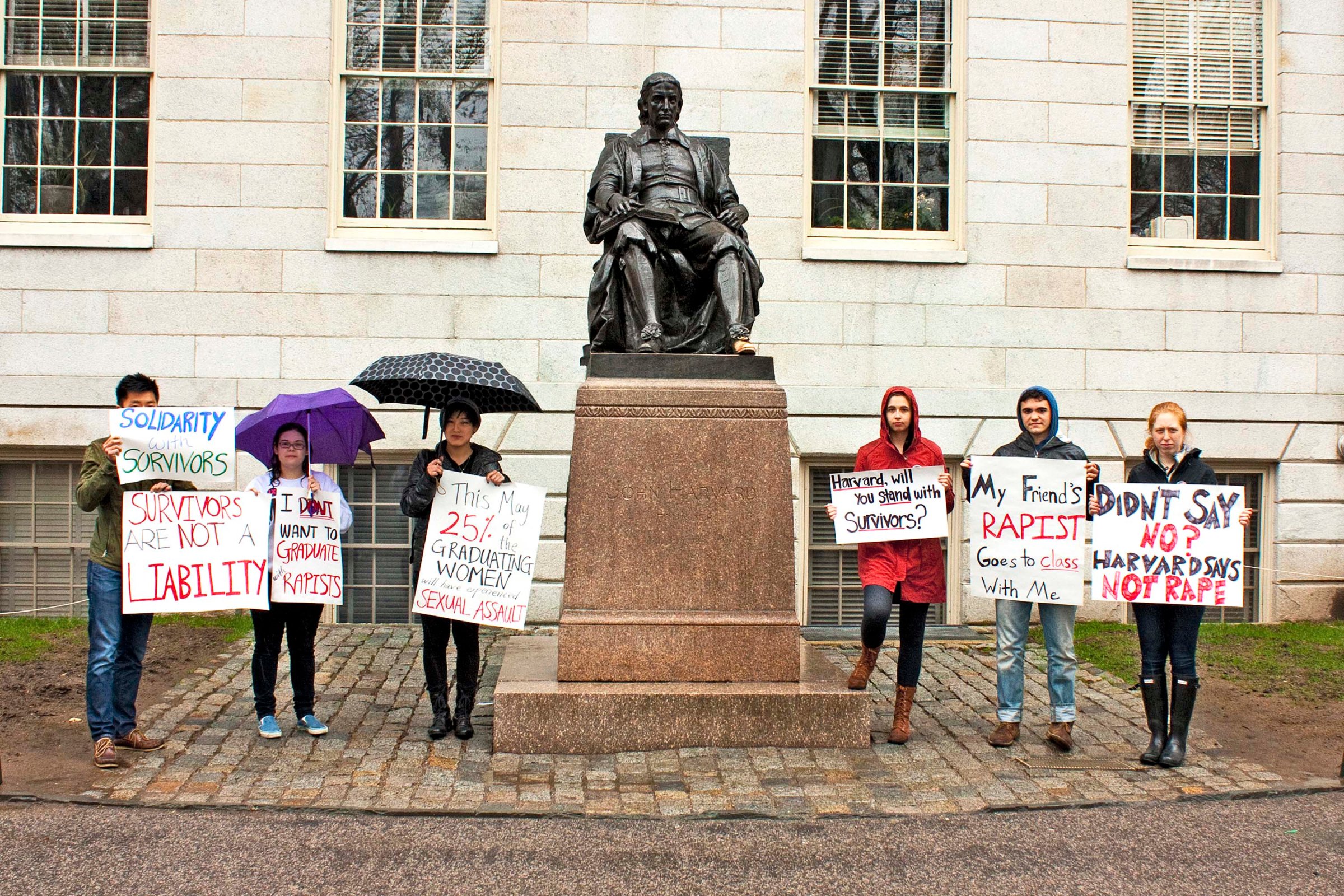
The delivery was polite, but the message cut like a dagger. “Harvard has adopted procedures for deciding cases of alleged sexual misconduct which lack the most basic elements of fairness and due process, are overwhelmingly stacked against the accused, and are in no way required by Title IX law or regulation,” wrote 28 current and former Harvard Law School professors in a letter published in the Boston Globe on Oct. 15.
The grenade lobbed from the Ivy League faculty lounge is the latest turn in a national debate over rape on college campuses that recently led California to require students to obtain ongoing affirmative consent for all sexual activity. It began in 2011, when the Obama Administration–armed with data showing that 1 in 5 women experiences sexual assault during college–launched a campaign to get schools to take the problem seriously. The Department of Education revealed that more than 50 schools were under investigation for mishandling sexual-assault cases, including both Harvard College and Harvard Law School. And new federal rules for dealing with campus sex crimes took effect this spring. Colleges that fail to comply can lose government funding. (See Time’s May 26 cover story, “Rape: The Crisis in Higher Education.”)
Schools spent the summer scrambling to steer clear of the feds by implementing new misconduct policies. Dartmouth made expulsion mandatory for certain kinds of sexual assault. Columbia removed students from disciplinary panels that handle sexual misconduct. And Harvard expanded its definition of sexual harassment and created a new process for handling it.
Our Harvard Can Do Better, a student group, says the rules are an “intermediate” step toward improving a system that for too long treated assault victims with suspicion. But to critics–including the professors who wrote to the Globe–Harvard’s solution overcorrects for the problem. They say the new procedures deny the accused basic tenets of due process, such as guaranteed representation and the opportunity to see the evidence against them and present a defense. And they believe that making the school’s Title IX office the investigator, prosecutor and judge biases the outcome.
“Harvard’s policy was written by people who think sexual assault is so heinous a crime that even innocence is not a defense,” says Alan Dershowitz, a defense attorney and law professor emeritus who signed the letter. “I feel strongly about rape. I have a daughter and a granddaughter, but once someone is accused, they should have a full, fair opportunity to defend themselves.”
It’s a noble idea, but colleges don’t have the power to jail offenders, only to banish them from campus. A student disciplinary hearing is a civil matter, not a criminal one. The challenge for schools is reconciling that leeway and their practical concern about deterring bad behavior with the loftier mission to model the ethical ideals taught in their classrooms. A series of recent lawsuits by students alleging that they were expelled from college without a fair disciplinary process underscores the need to get it right.
“We want to make sure justice is served in our community,” says Gus Mayopoulos, president of Harvard’s student council, “but we want to make sure it is served fairly.”
Harvard called the new policy “an expert, neutral, fair and objective mechanism” in a statement and said a university-wide task force would offer recommendations for improving it. Expect that process to take a while. After years of ignoring the problem, colleges are bound to encounter growing pains as they remake a system that has failed victims of sexual assault for so long. “Right now it looks like amateur hour,” says Brett Sokolow, a consultant who helps schools draft Title IX policy. “In 20 years it will be better.”
More Must-Reads From TIME
- The 100 Most Influential People of 2024
- Coco Gauff Is Playing for Herself Now
- Scenes From Pro-Palestinian Encampments Across U.S. Universities
- 6 Compliments That Land Every Time
- If You're Dating Right Now , You're Brave: Column
- The AI That Could Heal a Divided Internet
- Fallout Is a Brilliant Model for the Future of Video Game Adaptations
- Want Weekly Recs on What to Watch, Read, and More? Sign Up for Worth Your Time
Contact us at letters@time.com